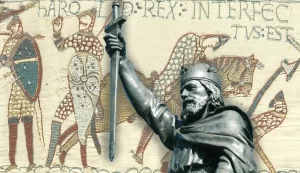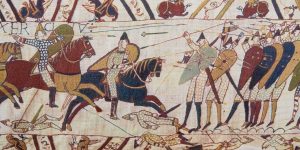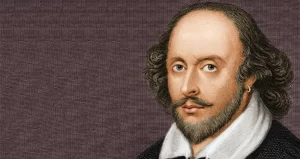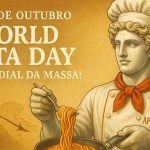Dia dos professores, história do inglês e MUITO MAIS!
Você já parou para pensar na história do inglês? Esse idioma, que hoje conecta pessoas ao redor do mundo, passou por mudanças gigantescas ao longo dos séculos. O que começou com o inglês antigo, trazido pelos Anglo-Saxões, evoluiu para o idioma global que conhecemos, cheio de expressões que amamos repetir — seja cantando uma música da Adele ou citando frases icônicas de filmes como Star Wars. A história do inglês é cheia de invasões, influências culturais e trocas comerciais, que moldaram as palavras que usamos no nosso dia a dia.
Ao longo dessa história do inglês, o idioma foi pegando emprestado palavras de outras línguas, como o francês e o latim, e até incorporou produtos exóticos de outras culturas, como chá e iogurte! Hoje, o inglês que conhecemos é muito mais acessível, mas ainda está em constante mudança, especialmente com a tecnologia e a globalização. E sabe o que faz essa história do inglês continuar evoluindo? Os professores, que dedicam suas vidas para ensinar e inspirar novos falantes! Vamos dar uma olhada nessa jornada linguística e celebrar quem está por trás de tudo isso.
Do you ever think about where the English language comes from?
No matter where you’re from, we all had the opportunity to sing along when Adele tells us to never mind, I’ll find someone like you and, yes, we absolutely took it. Also, I bet you remember the iconic “Luke, I am your father” line from Star Wars. Those things have nothing in common besides the language and the fact that those words in English stick to your brain, after all, English is one of the most spoken languages in the world. But before it became our favorite pop songs and shows, English was a very different language. It also has a very interesting story. Stick around and let’s take a look at how English started and changed over time!
Old English (450-1150 AD)

Going back more than 1,500 years ago, people in England spoke something called Old English. The word “old” gives you a hint that it was very different from the English we speak nowadays. The Anglo-Saxons, who come from Germany and Denmark, brought this language with them when they came to England and, for sure, they did not have wonderful and necessary expressions like “another day, another slay”. Of course, we still use some words from Old English without even realizing it, because they are simple words such as “house” and “friend,” but trust me: if you are walking on the streets and someone speaks to you using Old English now, you would definitely not understand it! Also, run away, this person has a time machine and might want to take you back to the past.
Middle English (1150-1500 AD)

In 1066, the Normans from France, being very inconvenient, invaded England and brought their language with them. Over time, Old English got mixed with French, and this blend created something called Middle English. This means that new words entered the language’s structure and we could finally ask things like where’s the beef, because the English word “beef” comes from the French word boeuf. However, even though Middle English was getting more distant from Romeo and Juliet and getting closer to Twilight, it still was like reading a classic Brazilian novel: you need some help to understand what the hell the people are saying.
Modern English (1500 – Today)

Allright, but how did we get to the slay part of English? Well, in the 1500s, right when people were realizing that washing your hands is good for your health, Modern English begins! A lot of interesting things take place in this period of time, like the reign of Elizabeth I and William Shakespeare, which were very important to the development of the English Language. Besides, all of that happened around the same time that the printing press was invented. Now, it was possible to print books, and spelling became more stable.
Many new words entered the language because of exploration and trade commerce. Products like yogurt (from Turkey) and tea (from China) became popular and the words were incorporated as part of English. Today, as technology and communication improves, people still change the language and English is spoken differently in many parts of the world, but the main structure stays the same and we can all say things like “this is the skin of a killer, Bella”.
Teaching English in the Modern World: A Teacher’s Superpower

But what does all of this have to do with teachers? Well, English wouldn’t be what it is today without the countless teachers around the globe helping people learn and understand it. It was a Teacher who made this text possible. And I’m not talking about me, as a Teacher, but about the Teacher who came before me and taught me how to read and write. Teaching English as a second language isn’t just about grammar and vocabulary — it’s about sharing a living, breathing language that’s constantly changing. English teachers are modern-day guides, showing students not only how to speak and write but also how to connect with a global community.
So today, on Teacher’s Day, let’s celebrate the amazing teachers who work tirelessly to help students conquer this crazy, ever-changing language. They play a huge part in shaping how English continues to evolve, and for that, we are forever grateful. Our Teachers around the world are helping people communicate, dream, sing their favorite songs, and even understand a Shakespeare quote or two!
Conclusion
Just like us in our teenage years, dying our hair with some low-quality paint while listening to Complicated by Avril Lavigne, the English language changed a lot over the years. From Old English to Modern English, the language borrows and adapts many words from other parts of the world. And as people continue to speak English all around the world, it will keep evolving and inspiring. So, let’s give a big shout-out to all the English teachers out there for making this journey possible, for every lesson, every correction, and every new word taught.
Happy Teacher’s Day to those who make the world a little more connected, one word at a time!
Now that you’ve taken a trip through the fascinating history of the English language, it’s your turn to be part of this ongoing journey! Keep learning, keep exploring, and don’t forget to thank the teachers who make it all possible. Share your thoughts in the comments, follow Apollo in our social media and let us know how English has impacted your life!




Uma resposta
Shakespeare é meu pastor e naaaaada me faltará!